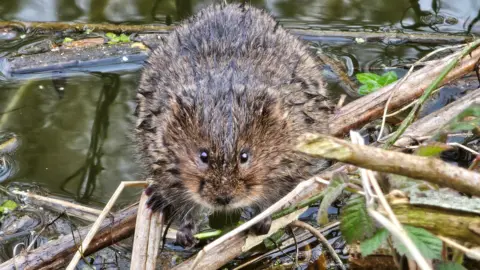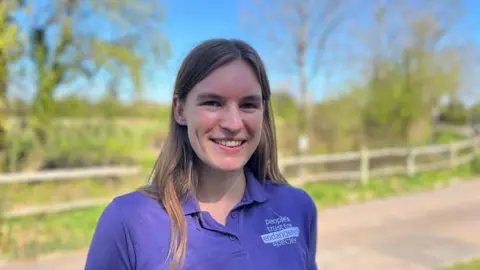'Help us spot Britain's fastest declining mammal'
 PTES
PTESPeople are being encouraged to help spot water voles in ponds and streams because they are "Britain's fastest declining mammal".
Water vole populations have declined by 90% due to habitat loss, fragmentation and becoming prey of the non-native American mink, according to wildlife charity People's Trust for Endangered Species (PTES).
Volunteers can choose from over 700 pre-selected riverbank sites across England, Scotland and Wales – or register a new site near them.
Last year, 113 sites were surveyed across Britain with water voles found at 47 of them.
"Water voles have the title of Britain's fastest declining mammal which is a pretty hard title to take on," said Emily Luck, water vole officer for PTES.
She told BBC Radio Sussex that populations had been affected by urbanisation, as well as becoming prey for the American mink which "developed a bit of a taste for water voles".
Water voles are listed as endangered on the red list for Britain's mammals - but Sussex is said to be a stronghold, with five sightings across 15 sites last year.
 George Carden/BBC
George Carden/BBCOne of those sites is Birdham, near Chichester.
"We're looking for feeding signs, droppings and burrows," said Emily.
"We're also checking some of the ditches, it may look like a run-off ditch on the side of the road – but it might be producing lots of vegetation and shelter for water voles. They use these ditches as corridors.
"To be able to know where to do our work, we need to know where the water voles are - and where they are doing well or struggling."
In the last 10 years, more than 2,000 sites have been surveyed by volunteers.
The charity said this had helped with "encouraging signs" of localised recovery with small-scale population increases in areas where they have focused conservation efforts.
Follow BBC Sussex on Facebook, on X, and on Instagram. Send your story ideas to [email protected] or WhatsApp us on 08081 002250.
